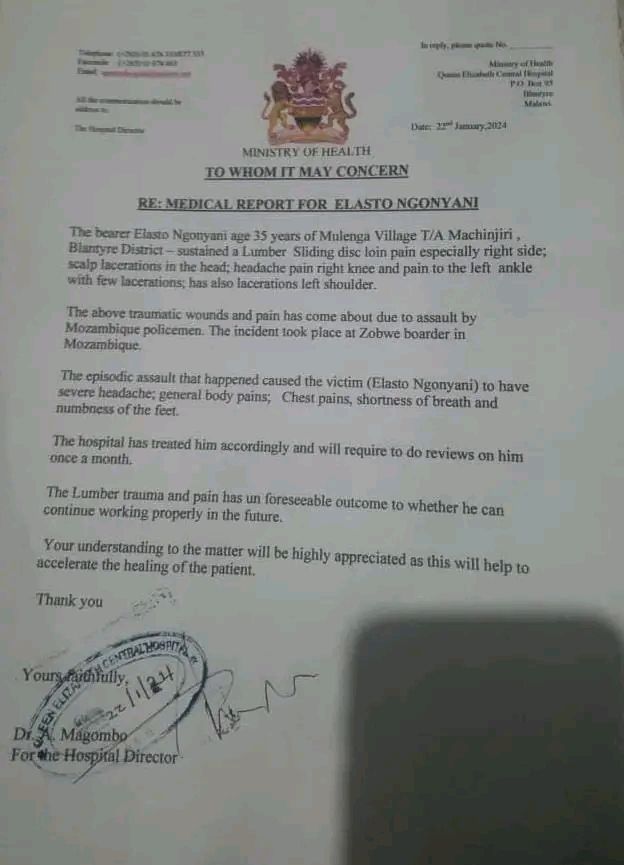By Twink Jones Gadama
Police brutality is a harrowing issue that continues to plague societies around the world. While numerous cases have been exposed and acknowledged, countless others remain hidden, leaving victims to suffer in silence. One such case that has recently come to light is the horrifying ordeal of Elasto Ngonyani, a 35-year-old truck driver from Malawi who fell victim to Mozambique police brutality at Zobue. This column aims to shed light on the challenges faced by foreign truck drivers and the urgent need for governments to address this grave issue.
The Medical Report: A Glimpse into Ngonyani’s Struggles
A detailed medical report from Queen Elizabeth Central Hospital has revealed the extent of Ngonyani’s injuries sustained during the brutal assault. The report highlights lumbar sliding disc loin pain on the right side, scalp lacerations on the head, pain in the right knee, and pain in the left ankle, accompanied by a few lacerations. Furthermore, Ngonyani is currently battling severe headaches, general body pains, chest pains, shortness of breath, and numbness in his feet as a result of the traumatic assault. These injuries not only hinder Ngonyani’s current ability to work but also pose significant challenges for his future livelihood.

The Cry for Change
Foreign Drivers Demand Diplomatic Intervention
In the wake of this horrific incident, Ngonyani has called upon the Malawi government to employ diplomatic means to end the rampant police brutality faced by Mozambican roads, particularly when directed towards foreigners. Foreign truck drivers often face discrimination and abuse at the hands of law enforcement, leading to physical and emotional trauma, as well as a hindered ability to continue their work. Ngonyani’s plea serves as a reminder of the urgent need for governments to prioritize the protection of foreign nationals, as well as to hold accountable those responsible for these acts of brutality.
Malawi’s Response: Diplomatic Efforts and Assurances
Happy Saka, Malawi’s Consul General for Tete and Zambezia provinces in Mozambique, has assured Ngonyani and the wider community that talks are underway with Mozambique authorities. Saka acknowledges the severity of the issue and promises that the matter will be appropriately addressed. While these diplomatic efforts provide a glimmer of hope, it remains imperative for concrete actions to be taken, ensuring lasting change in the treatment of foreign truck drivers.
The Hidden Suffering: A Widespread Issue
Ngonyani’s case is not an isolated incident; it is a stark reflection of the widespread and long-standing issue of police brutality faced by foreign truck drivers. Many drivers, hailing from various countries, have shared chilling accounts of violent encounters with Mozambique police, leaving them mentally and physically scarred. Whether it is unwarranted beatings, extortion, or harassment, their experiences paint a disturbing picture of the dangers they face along their routes.
Urgent Need for Enhanced Security Measures
In light of Ngonyani’s ordeal and the countless similar incidents, it is clear that urgent action must be taken to enhance security measures and safeguard foreign truck drivers on Mozambican roads. Authorities should prioritize the training and education of law enforcement officers, ensuring that they understand and respect the rights and dignities of all individuals they encounter. Additionally, robust mechanisms for reporting incidents of police brutality must be established, providing victims with safe avenues to seek justice and redress.
Collaborative Efforts for Safer Roads
The responsibility to end police brutality lies not only with the governments of affected nations but also requires collaborative efforts from international organizations, neighboring countries, and regional alliances. Greater cooperation must be fostered to address the root causes of this issue and implement comprehensive policies and initiatives that protect foreign truck drivers. By joining forces, nations can create safer, more inclusive road networks, ensuring the well-being of all who traverse them.
Conclusion
Elasto Ngonyani’s distressing ordeal serves as a poignant reminder of the silent suffering endured by countless foreign truck drivers at the hands of Mozambique police. His story highlights the urgent need for governments to prioritize and address this pervasive issue, employing diplomatic means to bring about lasting change. As awareness surrounding the plight of foreign drivers grows, it is essential for collaboration and collective action to shape a future where roads are safe for all, free from the terrors of police brutality.


